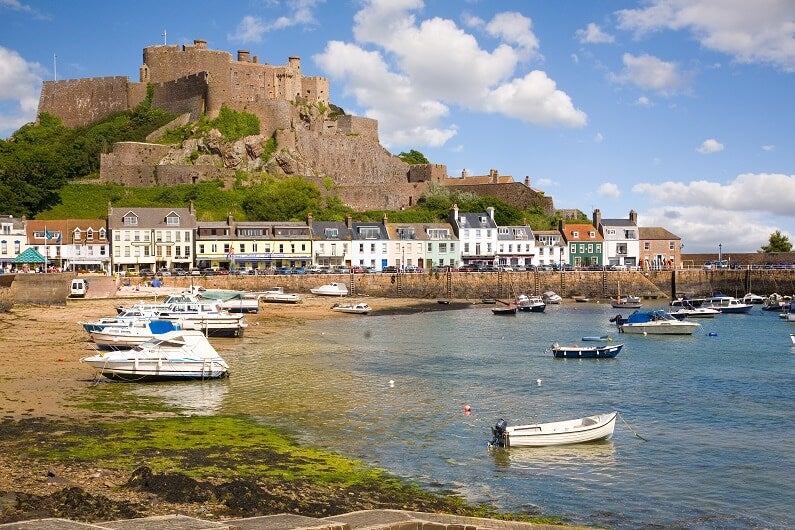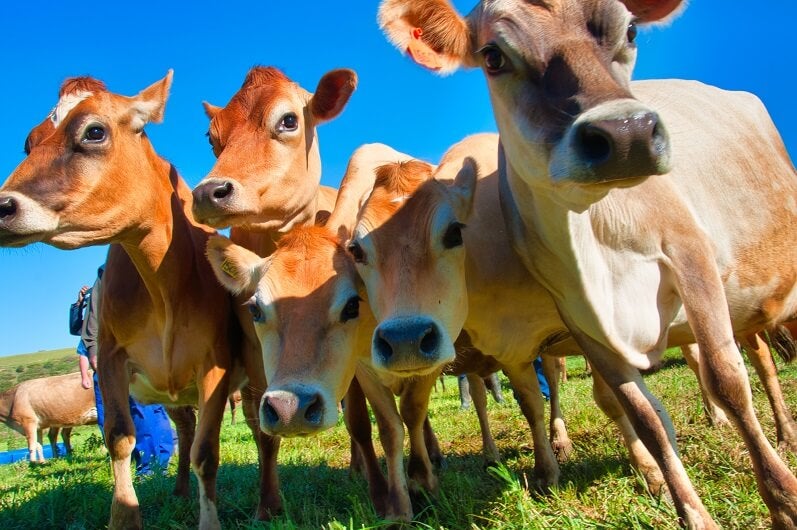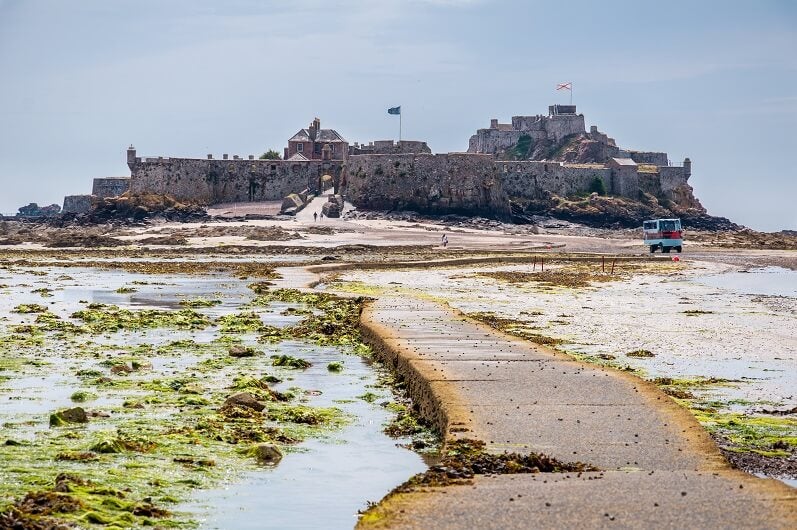21 Things to Know Before Moving to Jersey
Jersey, the largest of the Channel Islands, represents a unique blend of British and French culture.
The expat population is on the smaller side, but with a population of just 103,000, so is Jersey. The island is still a sought-after location for many people looking to experience its way of life.
Here are the essential things you need to know before moving to Jersey

Jersey’s coastal towns are picturesque
1. The speed limit is different to the UK
The maximum speed you can drive at in Jersey is a mere 40 miles per hour (mph), but when you’re on a small island there really isn’t any need to go faster. Even the roads where you can hit 40mph are few and far between — most are 30mph or less.
In the UK, seeing the National Speed Limit sign means being able to drive either 60 mph on single carriageways, or 70mph on dual carriageways.
2. Food is more expensive
Buying food in Jersey means paying an extra 5% in Goods and Service Tax (GST) on most items. This is because a large portion of Jersey’s food has to be imported. In the UK, the vast majority of food isn’t subject to a GST.
There are still plenty of farm shops selling food at a much cheaper rate, so it’s always worth seeing if you can pick up your weekly shop from them first.
Speaking of taxes…
3. Tax rates are different to the UK
Jersey is a self-governing island with its own legal and fiscal systems that differ to mainland UK. Because of this, tax rates are different.
For example, in the UK you’ll pay 45% income tax on earnings over £150,000. In Jersey, the income tax rate is a flat 20% regardless of what you earn.
Also, there is no Capital Gains Tax (CGT), so selling property and other items which are normally affected by CGT in the UK won’t incur any additional taxes in Jersey. Not too shabby.
4. Healthcare is different in Jersey
Despite its close connection to the UK, Jersey doesn’t have access to the National Health Service (NHS). Instead, residents in Jersey have to cover most of the costs involved in healthcare from their own pocket.
However, residents paying social security contributions receive a Social Security health card. This allows residents to access free or subsidised prescriptions and discounted GP visits.
In order to qualify for a Social Security health card, Jersey residents need to meet the following criteria:
- Live in Jersey for at least 12 months prior to treatment
- Live in Jersey for at least six months prior to treatment, during which time you have been in regular paid employment or paying income tax, and you have a valid health card
- You have Licensed status (check your status on this Jersey government site)
Jersey’s health cards don’t cover visits to the hospital, dental checkups, or other non-essential medical needs. Most residents also have at least some form of private medical insurance, typically provided by their workplace.
If you’re moving to Jersey, you can get some peace of mind by getting private coverage. That way, if anything unfortunate happens to either you or your family, you’ll be covered.
Check out our health insurance comparison table and find the best healthcare coverage for your needs.
5. An ancient language is still spoken here
Jèrriais, otherwise known as Jersey Norman, is a language with origins dating all the way back to when the Normans ruled Normandy in France.
Although speakers are declining annually, there are efforts to keep the language alive. In 2019, the government approved plans to reintroduce Jèrriais onto signage and other official documentation.

The many sheltered beaches are beautiful
6. Jersey uses £1 notes
Unlike the poor Brits clogging their pockets and wallets with £1 coins, Jersey residents use £1 notes.
If you do still have a lot of £1 coins hanging around when you move to Jersey, don’t worry. All UK currency is accepted there.
7. Property is very expensive
With limited space and high demand, property prices in Jersey have skyrocketed. As of 2021, the average asking price for a home reached £673,000.
That’s almost £400,000 more than the average cost of a home in the UK, which was £274,000 by the end of 2021. Renting is much the same, with the average rent in Jersey being 76% higher than in the UK.
8. In fact, everything in Jersey costs more
If you’re moving to Jersey, you better come with a healthy bank account, because it’s expensive here.
In 2021, the island topped the list of the world’s most expensive places to live.
It was found that on average, the cost of living in Jersey was a whopping 117% more expensive than the UK.
When you move to Jersey, you’ll need to make sure you’ve transferred enough cash to get by. We recommend using a trusted money transfer service, and thankfully we’ve already done the research to help you choose the right one. Check out our expert ratings and find the best money transfer provider today.

Jersey’s coastline is a popular trek for hikers
9. Cars don’t need an MOT (yet)
An MOT is basically a checkup for vehicles to make sure they’re still in good enough condition to safely use the roads. They’ve been a requirement for all cars on UK roads since 1960, but Jersey still hasn’t made them mandatory.
So you can see some real bangers putt-putting across the roads. This is all set to change however, as in 2018 Jersey announced that implementing MOTs would be a part of its Brexit preparations.
However, the COVID-19 pandemic delayed this step, meaning MOTs are not expected to be a requirement until at least 2024.
10. There is no road tax either
Car owners in Jersey don’t need to pay any road tax to drive on the island’s roads.
In the UK, you must pay around £165 every year. This money is used to maintain and repair UK roads.
Jersey instead does this with funds collected by the 12 parishes on the island.
11. Jersey cows are famous
The Jersey cow is among the best-known dairy cattle breeds in the world, thanks to the richness of the milk it produces.
On average, Jersey milk contains 20% more calcium and 18% more protein than most other milks. And because Jersey cows graze on the island’s lush green landscape, their milk also contains more omega-3’s and beneficial fatty acids than milk from pasture-fed cows.
Not only that, but they are easily up there with the most adorable cows on the planet, with their big eyes and playful expression. They also have one of the calmest temperaments of any farm animal.
12. There are extensive tunnels that were dug during the Second World War
In June 1940, the German army invaded Jersey, which they would occupy until May 9th 1945 (a day after the official end of the war in Europe). During the occupation, they excavated enormous quantities of rock for tunnel building.
The so-called Jersey War Tunnels were designed to shield German equipment, ammo, etc., from aerial bombardment and they were dug almost entirely using slave labour.
Going for a tour around the 1,000 metres of tunnels is well worth it. One highlight is the Ho8 tunnel, which was converted into a makeshift hospital by the German army.

Jersey cows produce some of the richest milk in the world
13. Jersey is brimming with history
For such a small area, Jersey has plenty to offer history fans, even beyond the Second World War tunnels.
Check out La Hougue Bie, a Neolithic site considered one of the oldest in Europe.
Seymour Tower is worth a visit too. It’s located on the shoreline and was built in the 1700s, after the failed invasion of Jersey by France. Be careful though, as staying too long could see you trapped by the tide.
14. The tidal range in Jersey is huge
Jersey has one of the world’s biggest tidal ranges, with an astonishing shift of almost 12 metres between low and high tide.
When the tide recedes, the island almost doubles in size. This reveals a maze of rockpools and wildlife just begging to be explored. But just like with Seymour Tower, be careful because the tide can return a lot quicker than many people expect.
Tourists getting trapped by the high tide is a regular occurrence, so if you want to blend in with the locals, learn to respect the tide!
15. Crime is practically non-existent
Jersey is an incredibly safe place to live, with one of the lowest crime rates in all the British Isles. It’s so safe that many Jersey residents leave their cars unlocked, confident that neither the vehicle nor its contents will be stolen.
16. Jersey has some of Europe’s cleanest beaches
It’s remarkable to think you can travel just 30 minutes by plane from London to Jersey, and see pristine beaches, turquoise waters, and palm trees.
The beaches in particular can be stunning, with basically no rubbish to be found. Regular beach-cleaning initiatives keep Jersey’s coastline clean and it’s a real point of pride for the locals.
St Brelade’s Bay and Green Island Beach stand out as the best examples of what Jersey has to offer. The latter beach’s white sands wouldn’t be out of place in more tropical parts of the world!

For a small island, Jersey has a lot of fascinating history
17. Schools follow the English curriculum
Families moving to Jersey will be pleased to learn that their children will benefit from the same curriculum and high level of quality found in English schools.
The only noticeable difference is the inclusion of Jersey-specific things, such as its unique history, geography, culture, and environment.
18. Jersey’s potatoes are protected
One of the island’s most iconic exports is its classic Jersey Royal potato, which account for a massive 70% of agricultural turnover.
The Jersey Royal potato is so important that it has a Protected Designation of Origin (PDO), meaning no other place in the world can grow the same variety, because of the importance the Jersey Royal has to local farmers.
19. It was once illegal to knit
In the 17th century, almost every islander knit, with an astonishing 10,000 stockings produced every week.
Unfortunately, knitting interrupted the seaweed harvest, so much so that Jersey passed an act in 1608 forbidding anyone over the age of 15 from knitting during the harvest.
Getting caught with a pair of knitting needles during this time could land you in jail.
20. Jersey was a refuge for pirates and criminals
Lawbreakers back in the day would frequently use Jersey as a stopping point before escaping to France, especially during the English Reformation when Henry VIII’s rebellion against the pope caused many devout Catholics to flee England.
Churches on the island often had steps leading straight to the beaches, so people fleeing could quickly make it down to boats waiting to ferry them to safety.
21. The classic red postbox started here
This feature, seen all over the UK, began life in Jersey in 1852.
It was part of an experiment to improve the postal system, and after a successful trial on the island they began springing up over the entire country.
Post boxes weren’t always the unmistakable red however — for their first 20 years, post boxes were green.
Ready to move to Jersey? You can take the next step by completing this short form to get free shipping quotes from trusted experts, who all have the experience necessary to move your belongings safely and securely into your new home.







